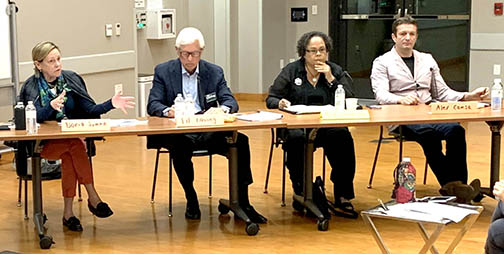
BY BRADEN CARTWRIGHT
Daily Post Staff Writer
In the final debate in the race for Palo Alto City Council, the seven candidates made their positions on housing clear: Four of them are happy to build, and three would rather not but understand that the city is under a state mandate to do so.
Candidates Ed Lauing, Doria Summa and Brian Hamachek are reluctant to fulfill the state’s quote of 6,086 homes in Palo Alto over the next eight years. Lauing and Summa both said the quota is over-inflated, and they don’t like “top-down” or “one-size-fits-all” approach from the state.
Hamacheck went a step further and said building that many units — a 20% increase in Palo Alto’s housing stock — would destroy the city. “It’d be a disaster if it were to happen,” he said.
On the other side, Julie Lythcott-Haims, Vicki Veenker and Lisa Forssell were more enthusiastic about building the housing.
“I not only accept, but celebrate the state mandate,” Forssell said.
Alex Comsa is pro-housing too, but his ideas are more outside the box, such as building thousands of apartments at the Palo Alto Airport.
Forssell and Veenker both said they want Palo Alto to come up with area plans that tell developers what they can build in certain places, such as along El Camino Real or San Antonio Road. The city could set rules in these plans in two years rather than focusing on one project at a time, Forssell said.
Lythcott-Haims said the city is facing an existential question.
“Where will the people go if our city doesn’t do its share?” she asked. “We have to respond to the demographic realities of our moment, rather than put our heads in the sand and say, ‘No no no, not here, not here — do it there.’”
Lauing said there is no limit to the number of people who want to live in Palo Alto, and the city isn’t obligated to fit all of them. The city should focus on the people who need to live here, such as those who need to work here or who have a low income.
Summa said the housing crisis isn’t caused by a lack of homes — rather, it’s caused by a lack of affordable homes.
That’s why Summa, along with Lauing, support focusing on projects that are 100% affordable and letting the market take care of the rest.
That’s a different approach than Lythcott-Haims, who said she wants developers to build apartment complexes with 20% of the units restricted at a below-market value rent.
Lauing said that a 20% affordability rate isn’t feasible for developers to make a profit. And if 15% of the units are affordable, then the city would have to build an unfathomable number of market-rate homes to meet the state quota for affordable units, he said.
Lythcott-Haims responded that she would look at 100% affordable housing projects too, and she supports both approaches. But having higher income and lower income residents live together is best, she said.
Lythcott-Haims then asked Summa how she would pay for housing projects that are 100% affordable. Summa said it’s very difficult and requires contributions from all levels of government and nonprofit developers.
Summa and Lythcott-Haims also had a back-and-forth over the Maybell project, which was a proposal to build a 60-unit apartment complex for low-income seniors, along with 12 single-family homes, in the Green Acres neighborhood. Residents put the development on the ballot, and a majority of voters killed the proposal in November 2013.
Summa said the project is irrelevant now, and she didn’t know why Lythcott-Haims was still talking about it. The voters determined the outcome, she said.
“To say you didn’t like that is to say you don’t like democracy,” Summa said.
Lythcott-Haims said she brought up the Maybell project because it was in her neighborhood, so it’s personal. She also said the United States has a history of bad things winning at the polls.

“That’s why Summa, along with Lauing, support focusing on projects that are 100% affordable and letting the market take care of the rest.”
Which means flood the market with cheap housing and every existing homeowner in Palo Alto can watch their property values sink like the stock market this year. I’m disgusted at my city council for their cavalier dismissing of my life savings because a bunch of people who aren’t successful want to live here.
I don’t think it’s possible to flood the market with cheap housing. Only (relatively high-end) market-rate housing is profitable to build here, which means that below-market-rate housing has to be subsidized. The State has made it clear that it won’t provide enough subsidies to make that happen. The local jurisdictions don’t have enough money to make that happen. Developers won’t build enough below-market-rate housing to meet the State requirements because then they can’t make a profit. I appreciate that Ed and Doria are stating this clearly, because the other candidates apparently don’t understand or don’t want to acknowledge the economics.
Re “flooding the market with cheap housing,” would you prefer to have an apartment building right next door to you with the windows aimed at your bedrooms and bathrooms?
That’s what advocates of “Peninsula Everywhere for Everyone” want and since they’re pushing mainly Market Rate Housing in the $1.5M+/ $%K a month range, it’s not cheap but does satisfy their deep-pocketed backers.
If you listen to Summa, she advocates putting new housing on Stanford land since they’re one of the biuggest local emplouers. Instead they keep removing available housing units to house their constantly growing community without regard to the ccommunity needs. Summa is right iun trying to get them to do their part.
(sorry. typo above. I meant to say $%K a month rent, not $96K; our rents are bad but not that bad.)